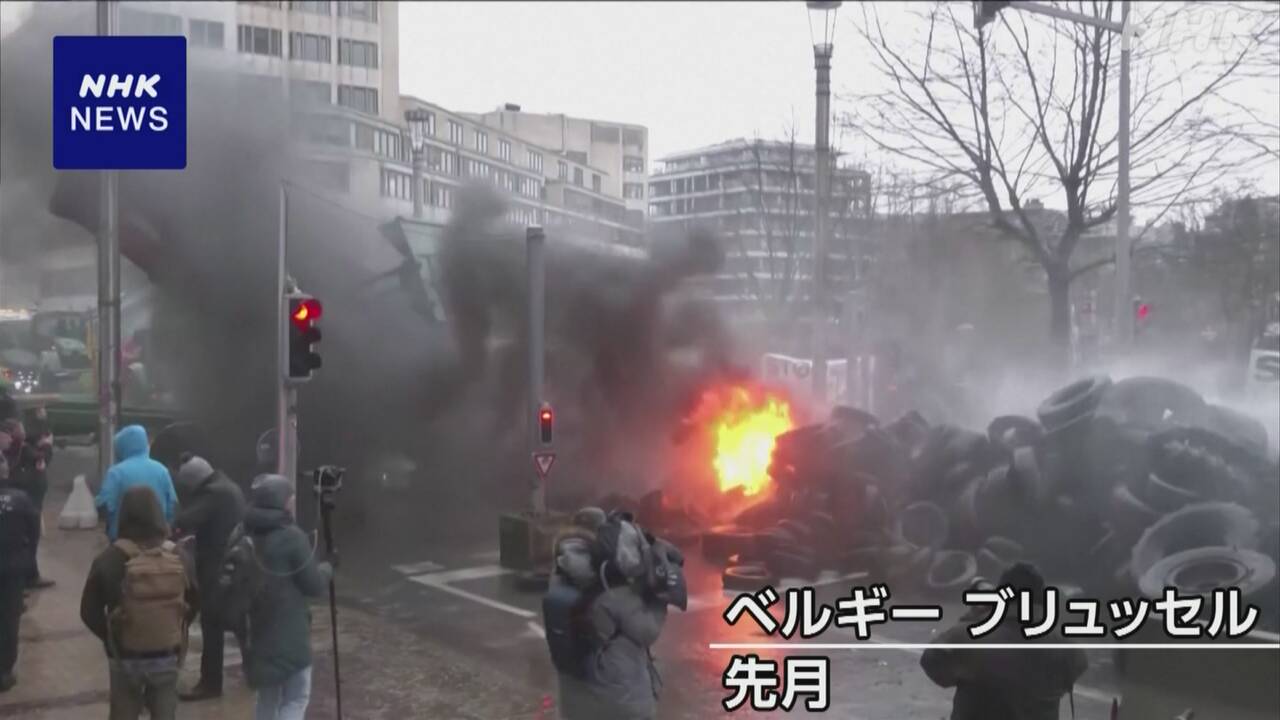In Europe, protests by farmers dissatisfied with the European Union's agricultural policies, including support for agricultural products produced in Ukraine, are occurring one after another in various places, and the EU is being forced to take action. It has been pointed out that support may also be affected.
In Europe, farmers have been under increasing burdens in recent years due to the need to comply with EU regulations regarding the use of pesticides and livestock breeding, as well as soaring fuel costs due to Russia's military invasion. It has been pointed out that relatively cheap agricultural products are flowing into European markets as a result of the European Union's decision to suspend tariffs on agricultural products.
Under these circumstances, in France, protests spread from January this year after the government announced the end of tax breaks for agricultural diesel fuel as an environmental measure, and highways leading to the capital Paris were temporarily closed. I did.
Protests have been occurring one after another in Germany, Spain, and other parts of Europe, and in Brussels, the capital of Belgium, a large-scale demonstration was held near EU headquarters last month, as well as in conjunction with the EU summit meeting held on the 21st and 22nd of this month. Farmers in Poland and the Czech Republic have launched protests, blocking highways and other areas.
The EU, which is busy dealing with the situation, is planning to introduce measures that take farmers' concerns into consideration, such as reimposing tariffs on sugar, eggs, and chicken, whose imports from Ukraine are increasing in particular, if they exceed a certain amount.
However, on the 20th, major agricultural organizations formed by European farmers issued a joint statement saying, ``It does not contain wheat or other ingredients and does not respond to farmers' concerns,'' indicating that they intend to continue protesting. Masu.
Experts have pointed out that the backlash in agriculture, which is an important industry for the EU, could affect future support for Ukraine, and the elections for the EU parliament and the European Parliament, which will be held in June this year. It seems that this will be one of the focal points.
French poultry farmers: “We are paying a very high price”
Olivier Senechal, a poultry farmer in northern France, raises 12,000 chickens and ships approximately 10,000 eggs to Paris and other places every day, but business has been difficult for the past two years.
Three years ago, at a cost of approximately 50,000 euros or 8 million yen in Japanese yen, the poultry farm installed air-conditioning equipment that can automatically adjust temperature, etc. in response to stricter EU regulations.
While the power consumption of poultry farms has increased, Russia's military invasion of Ukraine has begun, and electricity bills have risen by about 50%.
In addition, due to the soaring global grain prices caused by the military invasion, the cost of chicken feed has increased by about 30%, and the cost of transporting eggs has also increased, resulting in Seneschal's income being cut in half.
My income has decreased and I can't afford to hire anyone, so I'm working all year round, and I'm very worried about my future.
Mr. Senechal feels that the EU's suspension of tariffs on imported Ukrainian eggs is an unfair move that puts his products at a disadvantage.
“I am not opposed to aid to Ukraine per se, but we are paying a very high price and our farms and agricultural structures are at risk,” Senechal said. They called for the protection of farmers in the EU.
He also expressed concern about the future of agriculture, saying, ``I have a son, and I would be happy if he wanted to take over the family business, but now more and more farmers are not encouraging their children to take over.''
Expert “Ukrainian agricultural products have a significant impact on the EU agricultural market”
Sebastian Abis, a researcher at the French Institute for Strategic Studies in International Relations who is an expert on international politics surrounding agriculture, said, ``Although the amount of Ukrainian agricultural products imported to the European market is by no means large, it is on the rise. "Because they are imported, they will compete with more expensive European agricultural products," he said, analyzing the impact that Ukrainian agricultural products have on the European agricultural market.
"European farmers are wondering whether European markets should be kept open indefinitely for Ukrainian produce without considering the economic effects and the impact of unfair competition. This question must be answered. '', he said, indicating that farmers in the region are feeling a sense of crisis due to the continued influx of relatively cheap Ukrainian agricultural products.
He added that the impact of aid to Ukraine will be a focus in the European Parliament elections to be held in June this year, saying, ``Right now in Europe, should we continue to provide aid to Ukraine unconditionally, or should we do so in a way that protects our own interests?'' , there is a lot of discussion going on. If parliament is dominated by members who don't want Europe to be united, there is a risk that it will lead to bad outcomes for Ukraine as well," he said. If political parties that are skeptical about aid to Ukraine gain momentum as a result of dissatisfaction, aid to Ukraine could be delayed.

